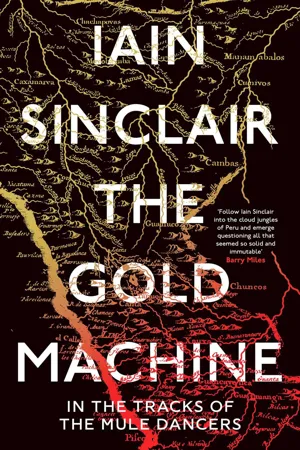
- 356 pages
- English
- ePUB (mobile friendly)
- Available on iOS & Android
About This Book
A New Statesman Book of the Year, 2021 'Follow Iain Sinclair into the cloud jungles of Peru and emerge questioning all that seemed so solid and immutable.' Barry Miles From the award-winning author of The Last London and Lights Out for the Territory, a journey in the footsteps of our ancestors. Iain Sinclair and his daughter travel through Peru, guided by – and in reaction to – an ill-fated colonial expedition led by his great-grandfather. The family history of a displaced Scottish highlander fades into the brutal reality of a major land grab. The historic thirst for gold and the establishment of sprawling coffee plantations leave terrible wounds on virgin territory.In Sinclair's haunting prose, no place escapes its past, and nor can we. ' The Gold Machine is a trip, a psychoactive expedition in compelling company.' TLS
Frequently asked questions
Information
Hell’s Gates
Why man, an island as large as Ceylon or Ireland or 18,000,000 acres occupied as yet by a population only equal to that of Aberdeen, the granite city. And, oh, man, the glorious rivers now stocked with salmon and trout! At present my notes must be brief, for the time of dreams and sentiment is past and the time for work has arrived…My first impressions of Hobart were anything but disappointing: its spacious streets, handsome freestone buildings, beautiful vegetation and delightful temperature more than fulfilled anticipations.
To find temporary shelter for my family was my first duty. I had not very much difficulty in arranging a good hotel at two guineas per head per week for board and lodging. This accomplished, I walked out to the Botanical Gardens to see what this celebrated climate and soil can produce. And for a few hours I simply revelled amongst the numerous old European friends which seem to have found so congenial a home. Giant geraniums, brilliant verbenas and a perfect jungle of Helétrope, greet me as I enter the gate. The gardeners though civil are not very communicative.I could willingly spend days in these lovely gardens, but I am reminded that a more pressing if less agreeable duty awaits me, viz., house-hunting, which here, as at home, I find to be the most worrying, wearying work I ever engaged in. My requirements were simple and definite enough: ‘To rent with option of purchase, a good house with orchard or small farm, river frontage, &c.’‘No need to advertise,’ said agents in London, ‘you’ll find at once abundance of what you want.’ In vain however I scanned the papers on arrival and those terrible imposters the house agents by their most exaggerated descriptions gave me many a vain journey.My chagrin may be imagined on finding the ‘rich land’ to be an exhausted and abandoned field by the side of a lagoon, without the ghost of a tree or shrub: here a thistle and there a sweet-briar tried to find their way through the baked clay, but both seemed inclined to give up the struggle in despair. Years ago there evidently had been a roof of some sort, but this portion had entirely disappeared.
The sun was now high in the heavens, and the day proved one of the hottest of the season, the thermometer recording 100.2 in the shade… The house was deserted but in fair order… The orchard of about 2 acres was fully stocked with apples, apricots, plums and peaches, and, though quite abandoned, bearing really astonishing crops… I now sauntered on the lawn. ‘This,’ thought I, ‘is exactly what I dreamed of and the sooner I secure it the better. With what pleasure I shall mow down these weeds! Renovate the flower-garden and see the orchard put in order! And then should some old Ceylon friend come and see me… only think of the fishing!’
The owner is a very wealthy man and does not care to let or sell. Though living in Victoria he is one of the largest proprietors of Tasmania, owning 93,000 acres chiefly along the principal river valleys, many of the blocks shaped fan-like so as to take in as much of the river frontage as possible. In short, Mr X is a species of land-grabber, the bane of this and every country they exist in, and the pitiable Government of this colony, while enforcing strict laws upon the poor little immigrant, wink at the squatocrat who may hold 100,000 acres and not employ a dozen men or spend £100 in the colony. But, by George, their day is coming! ...
Table of contents
- CONTENTS
- Glints
- By the Brown River
- Something out of Something Else
- Dirty Sand
- The Silence in the Forest
- Frets
- The Map on the Downstairs Wall
- Visiting Agent
- Passage Money
- The Beast in the Jungle
- Casement’s Camera
- Guano
- Tasmania
- Hell’s Gates
- Into the Interior
- Fevers
- The Advocate
- Lima
- Breakfast
- Bones
- Soroche
- Convento de Santa Rosa de Ocopa
- La Oroya
- Tarma
- La Merced
- Furies
- San Luis de Shuaro
- Maria Genoveva Leon Perez
- Lucho’s Farm
- Cerro de la Sal
- Pampa Michi
- Bajo Marankiari
- The Waterfall
- Mules
- Mariscal Cáceres
- Pichanaki
- Puerto Yurinaki
- Cascades
- Pampa Whaley
- The Cage of Paper
- Melbourne
- Proxima Centauri
- Solly Mander
- Select Bibliography
- Acknowledgements